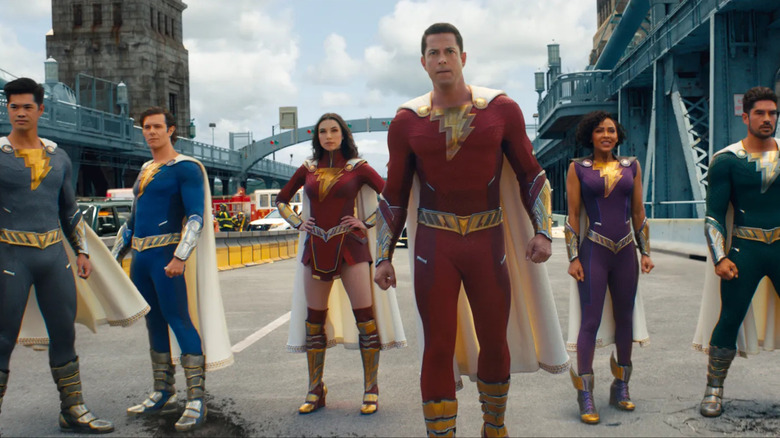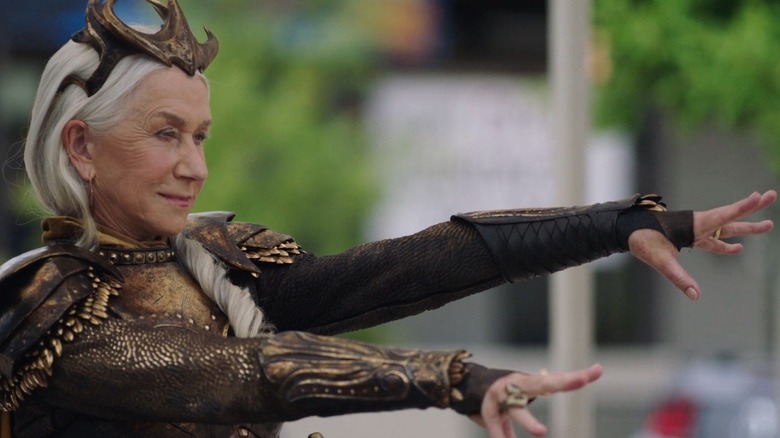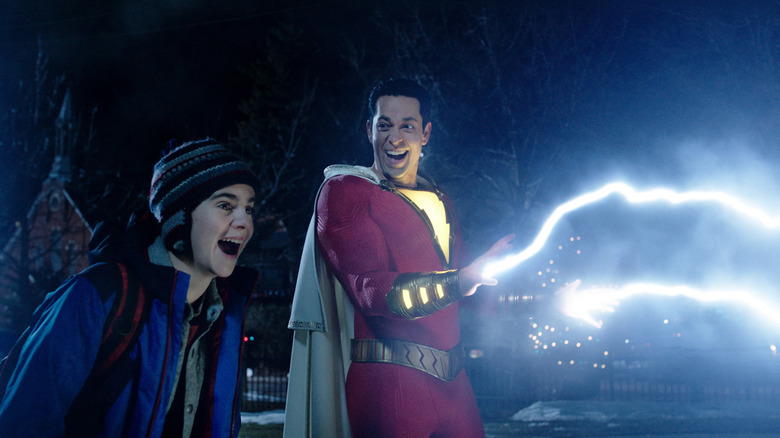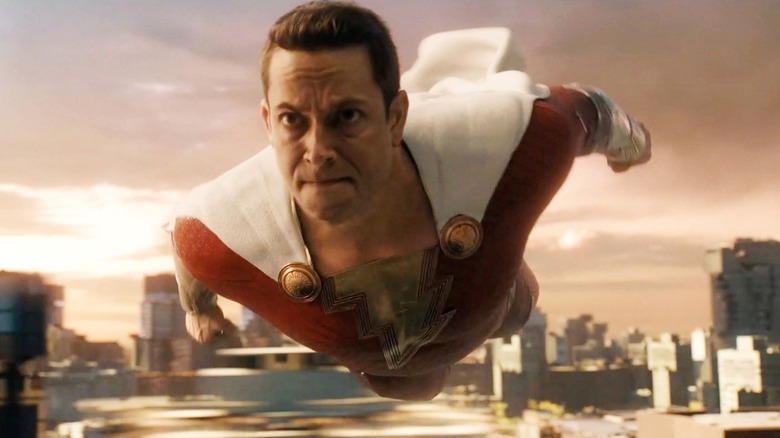If James Gunn Allows Shazam 3 To Happen, What Should It Be About?
It's worth noting right away that there will likely be no "Shazam! 3." Not only has "Shazam! Fury of the Gods" been welcomed by unimpressive box office numbers, but James Gunn and Peter Safran, who were recently put in charge of all the movies and TV shows based on DC Comics, appear to be planning to wipe the slate clean. A few more films in the superhero continuity that began with "Man of Steel" in 2013 will play in theaters before this year is over (still forthcoming are "Blue Beetle," "The Flash," and "Aquaman and the Lost Kingdom"), but there will likely be no follow-ups to them. Additionally, many of the current DC TV shows like "Doom Patrol" and "Titans" will also be taken off the roster. Gunn and Safran's mandate begins with cleanliness.
Speculating about what might go into a third "Shazam!" film will have to remain 100% academic. There is very little reason to believe that such a film will ever be made, or that audiences will ever see that character again. After "Fury of the Gods" and the disappointment of the "Shazam!"-adjacent "Black Adam," there's every reason to believe that these characters will be retired indefinitely. If they do return to cinemas, it will be under auspices well outside the ballyhooed Snyderverse.
But there are those among us who liked the character, and this author happens to believe that the 2019 film "Shazam!" is one of the best superhero movies ever made. As such, looking ahead with the character is a pleasant fantasy to ponder. What would "Shazam! 3" (or perhaps "Shazam !!!") look like in the parallel universe where it exists?
It's all about family
The central themes of the two "Shazam!" films to date have been about found families. Billy Batson (Asher Angel) was a troubled teen in the foster care system, constantly running away and determined to find his birth mother. At the beginning of the first "Shazam!", Billy was placed with a large family populated by other foster siblings, but he had been rejected by so many families in the past that he felt his time there was temporary. When a wizard gives him the ability to transform into a superhero, occupying an adult body, he finds he is more easily able to relate to his brother, Freddy (Jack Dylan Grazer). While Billy's first impulse as an adult is to merely buy beers, he eventually comes to realize that doing flashy lightning tricks and flying can be used for righteousness. By the film's end, not only has Billy matured as a hero, but he has shared his powers with his siblings, creating a family of Shazams that can fight villainy together.
In "Fury of the Gods," Billy's anxiety remains as he is about to turn 18 and will age out of the foster system. There's no reason for him to believe that his family will kick him out, but he is anxious about the possibility nonetheless. Meanwhile, he and his siblings, superheroes all, are learning to be better heroes. Billy's found family find themselves facing off against three sisters, the goddess daughters of Atlas, who want to take back Billy's powers for themselves. Prior to "Shazam!", they were the powers' rightful owners. One side has a caring family, while the other is ripe for villainy and betrayal. There's no guessing which family will prove stronger.
(As Vin Diesel said, it's all about family.)
No more villains
The weakest elements of the first two films have been their villains. While Mark Strong played his part well, and Helen Mirren at least was game enough to wear a silly costume, the villains and their plots have felt perfunctory and artificial in a screenwriterly sort of way.
I posit the following daring premise for "Shazam! 3": A superhero film without a supervillain. While the Shazam character has had a long and varied history (the character was the subject of a great deal of litigation since his days in Fawcett Comics), the character's extant lore is not so ingrained in fandom's consciousness as to have a notable rogue's gallery. Indeed, depicting "Shazam!" slamming his fists into a monster's jaw is less exciting than watching him wrestle with his neuroses and be just a regular kid. Superheroes have always possessed an element of power fantasy escapism, allowing little kids to project themselves into powerful bodies. "Shazam!" understands that, and the thrill of the film is watching Billy's fascination with heroism, not his beef with evil figures.
That childlike fascination with superheroism is lovingly retro. As such, "Shazam! 3" should be a time travel story.
Through one of his many magical widgets, Billy and his siblings could be thrown back in time to 1940, the year Shazam/Captain Marvel debuted on the page. They live in a world without Superman, Wonder Woman is already in hiding, and they are able to carve out a name for themselves. However, the sexist and racist America of 1940 causes trouble for Billy's family. They find that they have to rely on each other more strongly in a world that loves their power but hates who they are.
Shazam! In 1940!
While the Marvel Cinematic Universe has trained audiences to see superheroes as a freelance military force who only gather to do violence on the battlefield, superheroes can also — lest we forget — be about justice and righteousness. Villains may posit an immediate military threat to Earth, and the subsequent fight scenes are exciting for many of the superhero genre's fans, but there is something to be said for powerful people ridding the world of relatable crime.
The Shazam family is multiracial, and fighting prejudice in the world would be a challenge for them. They would have to be figureheads, but come to know that many systems are in place to stymie their rights. As a family, they would have to grow up. And then, once faced with the horrors of World War II, would they have the temerity to stop the war altogether? It seems that a true hero would do everything in their power to end all military conflict. This was something touched upon in Patty Jenkins' "Wonder Woman," but walked back many of its themes of the inevitability of human combat by putting it in the hands of Ares, a magical being. "Shazam! 3" could take the opportunity to put war back on the shoulders of humanity.
I'm not suggesting a dark film wherein the teen characters witness the Holocaust firsthand, of course. That would be too heady for a lighthearted superhero story. But a fish-out-of-water superhero comedy wherein 21st century teens have to become used to life in 1940, and find that they can use their powers to erase prejudice and corruption in the Golden Age of Superheroes? That's a power fantasy I think we all share. Superheroes can do more than punch demons. They can rewrite history for the better.



